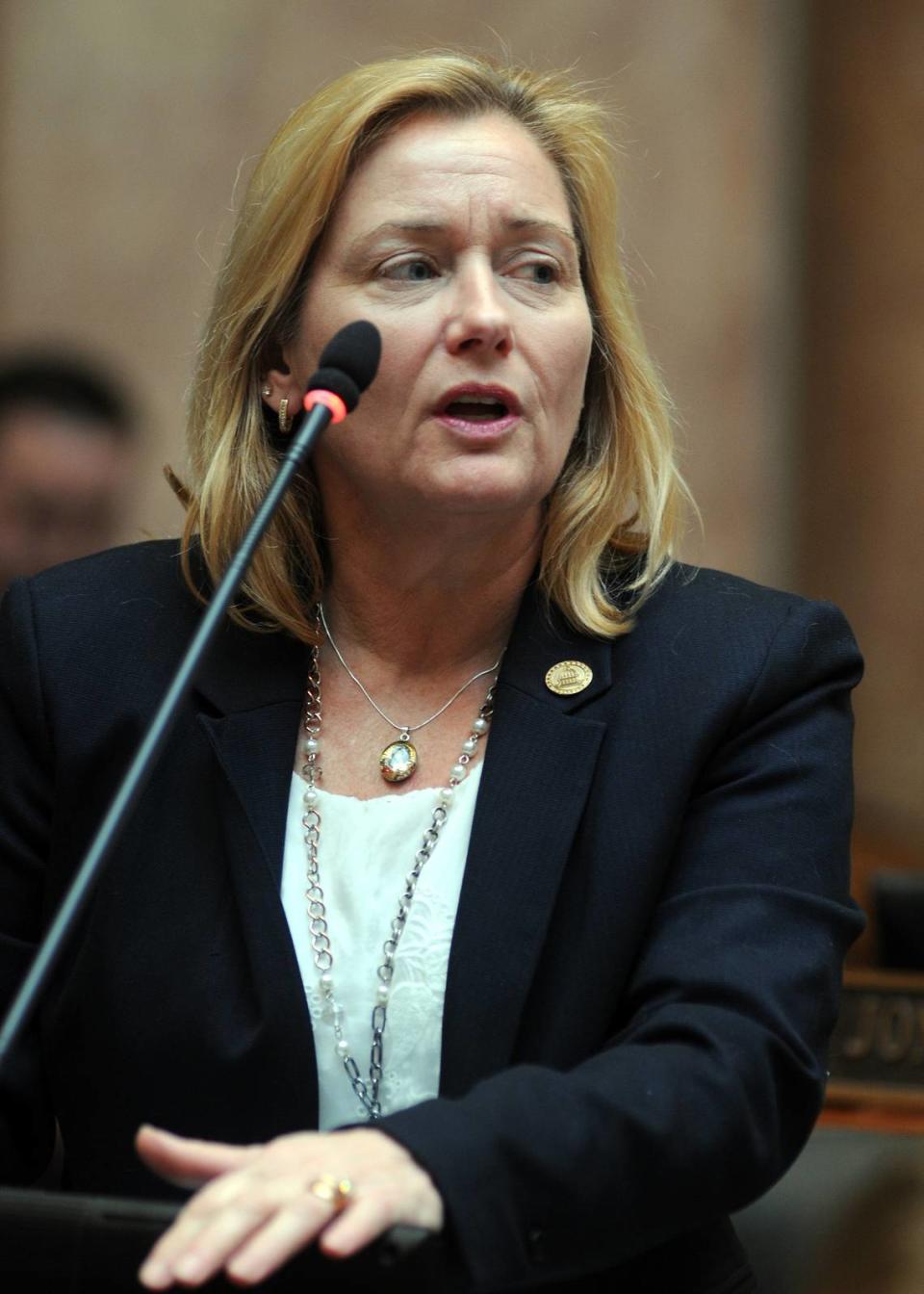KY rep. files bill requiring video produced by anti-abortion group to be shown in schools
A bill requiring public schools to teach students about “human growth and development” by way of a computer-generated video produced by an anti-abortion nonprofit, was filed Tuesday.
Under House Bill 346 from Rep. Nancy Tate, R-Brandenburg, each public school district would have to incorporate this curriculum starting in middle school.
It must include presentation of a “high-definition video, at least three minutes in duration, showing the development of the brain, heart, sex organs and other vital organs in early fetal development.”
The presentation also must include a “high-quality, computer-generated rendering or animation showing the process of fertilization and every stage of human development inside the uterus, noting significant markers in cell growth and organ development for every week of pregnancy until birth,” according to the bill.
The “Baby Olivia Act” — and the specific video parameters it calls for — is a reference to the “Meet Baby Olivia” video.
It’s produced by Live Action, an anti-abortion group espousing the Christian worldview that “life begins at fertilization” and refers to itself as a “digital leader of the global pro-life movement.”
Sign up for our Bluegrass Politics Newsletter
A must-read newsletter for political junkies across the Bluegrass State with reporting and analysis from the Lexington Herald-Leader. Never miss a story! Sign up for our Bluegrass Politics newsletter to connect with our reporting team and get behind-the-scenes insights, plus previews of the biggest stories.
In an interview Wednesday, Tate said this video “is meant to be an addition to science class, (because) it’s really important for children to understand human development.”
A similar bill was filed last week by Republicans in West Virginia, requiring the “Meet Baby Olivia” video be shown to public school students beginning in eighth grade.
The video, just over three minutes long, begins with the fertilization of an egg, showing its development into an embryo, then a fetus through all stages of pregnancy until birth.
A narrator explains each stage, at times detailing aspects of pregnancy and presenting them as fact, even though the reality is more complex.
For example, over a computer-generated clip of an embryo with a consistent heartbeat, the narrator explains that at three weeks gestation, “Olivia’s heartbeat can be detected.”
In reality, while the heart begins to form during the third week of pregnancy, describing this early fetal cardiac activity as a “heartbeat” — which typically begins around the sixth week of pregnancy, not the third — is misleading, even inaccurate.
According to the American College of Obstetricians and Gynecologists, “It is clinically inaccurate to use the word ‘heartbeat’ to describe the sound that can be heard on ultrasound in very early pregnancy.”
Among the list of health care providers who “reviewed and certified” the video include a handful who are affiliated with the Charlotte Lozier Institute, a conservative think tank researching the “value of human life,” and the right-leaning American College of Pediatricians.
That’s not to be confused with the American Academy of Pediatrics, a major medical association.
Designated by the Southern Poverty Law Center as an LGBTQ “hate group,” the American College of Pediatricians has lobbied state governments in recent years to pass laws restricting abortion, as well as laws limiting or banning gender-affirming health care, including in Kentucky.
Live Action, the production company responsible for the video, was founded by Lila Rose, who celebrated the fall of Roe v. Wade by saying in 2022, “We are now living in a time where completely ending abortion is possible.”
The right-leaning group also says rape and incest are not justifiable reasons for terminating a pregnancy, saying on its website, “Even in excruciatingly challenging situations — such as rape/incest — the human rights of pre-born humans are just as valid. The right to life cannot be revoked simply because the child’s biological father is a rapist.”
Tate, herself, has publicly opposed adding rape and incest exceptions to Kentucky’s near-total abortion ban, which only legally permits abortion in medical emergencies that threaten a pregnant person’s life.
In addition to setting new health education requirements, Tate’s bill includes a provision that would allow the attorney general to bring civil action against any district that refuses to incorporate the video into health curriculum.
Any parent or student over age 18 may also file a civil suit against a district for non-compliance.
As co-chair of the General Assembly’s Pro-Life Caucus, Tate has had a hand in most bills passed into law in recent years that restrict, regulate or ban abortion in Kentucky.
That includes the trigger law in 2019 to outlaw abortion unless the life of a pregnant person is imminently threatened — a ban still in place today.

“I’m really excited about the fact that there’s been no legal abortion in the commonwealth of Kentucky since August of 2022,” Tate said Wednesday.
At a Family Foundation policy forum in October, Tate hinted at filing policy this session to add punitive laws against state organizations that “aid and abet” Kentuckians who travel across state lines to get abortions.
While nothing to this effect has yet been filed, on Wednesday, Tate said, “That’s still legislation I’m looking at, (but) we’re just treading that very carefully. We feel like we’ve passed as much anti-abortion legislation as we need to.
“What we’re really doing is doubling down on trying to look at resources that need to be made more available to women and their families,” she added. “We need to concentrate on what were the barriers that were present that were encouraging women to have the abortions.”
This legislative session, Tate is co-sponsoring a bi-partisan proposal to strengthen support networks for pregnant women and new moms, and another bill that would allow for child support to be collected “at any time following conception.”
HB 346 has not yet been assigned to a legislative committee — a requisite step before it can be deliberated and voted on.

